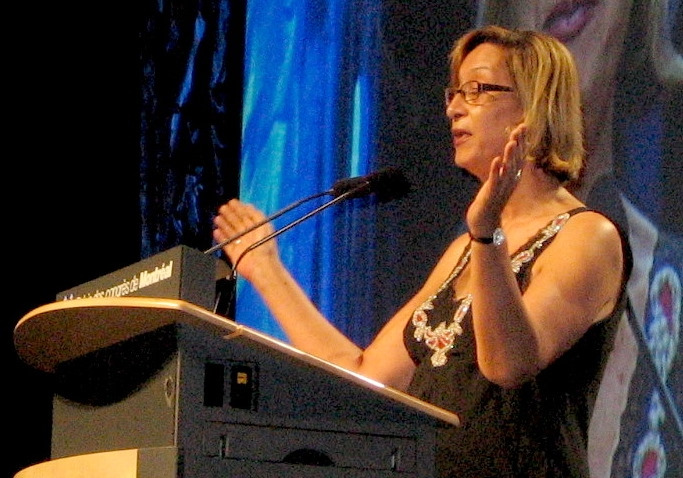Remembering trailblazing transgender politician, Georgina Beyer
Tributes are pouring in online for Georgina Beyer, who passed away on March 6 at the age of 65. The trailblazing New Zealand politician made history as both the world’s first transgender mayor, and as the world’s first openly transgender member of parliament—ever, anywhere.
The fact that Beyer made history in far-flung New Zealand was indicative of the challenging state of politics in the Northern Hemisphere where women, people of color, and gender nonconforming folks cannot often rise beyond their station. But Antipodeans rejoiced at Beyer’s identity and her progress, as early as 1995 when she was elected mayor of Carterton, making her the world’s first openly transgender mayor anywhere.
In another huge step, in 1999 Beyer became the world’s first openly transgender member of parliament and during her service supported progressive policies including legalizing sex work, civil unions in the absence of full marriage equality, anti-discrimination laws and upholding the rights of New Zealand’s indigenous people, the Māoris.
Beyer was born in 1957 in Wellington and assigned male at birth. She was of European and Māori (Te Āti Awa, Ngāti Mutunga, Ngāti Raukawa, and Ngāti Porou) descent. Beyer’s early home life saw unhappiness and upheaval, and when she was sent to boarding school she attempted suicide.
Beyer moved to Australia and in 1979 was sexually assaulted in Sydney and did not seek help from police out of fear, which struck her as a civic and political injustice. She returned to New Zealand where she pursued a career in acting and performance, including stints as a radio host and local news presenter. She became a part of the Wellington gay nightclub scene, as a singer and drag queen, and later as a sex worker. In 1984, Beyer underwent gender-affirming surgery.
Beyer became more involved in local politics, winning election to a local school board, then as mayor of Carterton embodying several first: first trans, first woman, and first Māori in that district.
She was highly regarded both by fellow politicians and by her constituents, and she was re-elected with 90% of the vote. In 2000 she resigned to enter Parliament, elected by a right-leaning electorate, and made no bones about claiming her identities in her maiden speech.
I can't help but mention the number of firsts that are in this Parliament. Our first Rastafarian [Nándor Tánczos]… our first Polynesian woman [Luamanuvao Winnie Laban]… and yes, I have to say it, I guess, I am the first transsexual in New Zealand to be standing in this House of Parliament. This is a first not only in New Zealand, ladies and gentlemen, but also in the world. This is an historic moment. We need to acknowledge that this country of ours leads the way in so many aspects. We have led the way for women getting the vote. We have led the way in the past, and I hope we will do so again in the future in social policy and certainly in human rights.
In the 2002 election, Beyer was re-elected with an even larger majority vote. Beyer self-identified as a “transsexual”, meaning, at that time that she had transitioned from one sex to another. In a 2001 documentary made about her titled Georgie Girl, Beyer, who was named after her grandfather George, said: “I get asked questions no other politician would ever have to answer. Regarding the surgery, you know. ‘Did it hurt?’, or, ‘When you have sex now as a woman, is it different to how you had sex as a man?’ Well, honey, obviously.”
Beyer was lightyears ahead of the rest of the world on many key issues vital to the LGBT community. In 2001 she supported the addition of sexual orientation as protected under the Human Rights Act 1993. In 2004 she put forward a member’s bill that would add gender identity a prohibited ground for discrimination. She withdrew the bill only after the Solicitor-General provided stated gender identity was already covered by existing New Zealand law. Ahead of many countries’ protections of First Nations culture, Beyer was instrumental to the passage of the Māori Language Act 2003.
Beyer retired from parliament in 2007.
She also enjoyed a public speaking career, and was a keynote speaker at the first International Conference on LGBT Human Rights in Montreal in 2006; and the second International Conference in Copenhagen in 2009. Beyer was invited as a speaker to Oxford University’s debating society Oxford Union and at the University of Cambridge’s Cambridge Union in 2018. She was the first person of Māori descent to address the Oxford Union. In the 2020 Queen’s Birthday Honors, Beyer was appointed a Member of the New Zealand Order of Merit, for services to LGBTIQA+ rights.
Formidable, tender, and with an incredible sense of humor, Beyer was impossible to ignore, and a credit to our community, and to the community of transgender, mixed-race and First Nations women. May we never forget what she stood for, and all that she did.
Beyer was diagnosed with kidney failure in 2013 and until she received a kidney transplant in 2017, she underwent kidney dialysis four times a day, seven days a week.
Beyer died on March 6 2023 in hospice care, according to a Facebook post by Scotty Kennedy, a friend.
“Georgie was surrounded by her nearest and dearest 24/7 over the past week, she accepted what was happening, was cracking jokes and had a twinkle in her eye, right until the final moment,” Kennedy wrote.






